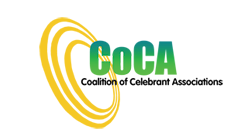| Performance evidence: |
The candidate must show evidence of the ability to complete tasks, manage tasks
and manage contingencies in the context of the job role:
- Identify a range of loss and grief situations and associated ceremony/rituals for each of the following groups: individuals, couples, families, groups and communities
- Document the range of possible celebancy services related to loss and grief that the community could receive from a family / community oriented celebrants and the objectives and cost of each possible service
- Identify and describe the following aspects
- personal, religious, social and cultural attitudes to death and dying
- Social, religious and cultural differences and traditions related to loss and grief
- Range of options families have for preparing for and dealing with death
- Difference between religious and civil celebrants in providing loss and grief related services and in the costs and other factors related to their work.
- Prepare, deliver and evaluate (XX number of) talks/ meetings with clients covering the following aspects:
- The range of possible ceremonies and services related to loss and grief provided by a professional celebrant
- The benefits of pre-funeral ceremony planning
- The aspects and purpose of pre-funeral ceremony planning services such as life story information
- essential information required for the death certificate, information required for the next of kin / or power of attorney to enact the person’s wishes
- Plan, conduct and review (XXX) number of pre- loss/death ceremony planning services for clients (individuals, couples, family members and friends/ group)
- Plan and document a community memorial ceremony for a situation involving war or natural disaster, detailing all aspects of the ceremony (including a time-line, role of participants, resources required, risk assessment etc) and evaluate the ceremony plan in conjunction with another professional celebrant
- Plan and document a ceremony for the loss of function, person, role, relationship, place, or circumstance etc. for an individual, couples, families, groups or communities on (xxxx) occasions to ensure consistency of performance and ability to respond to different situations
- Plan, conduct and review eight funeral, memorial and another ceremonies related to loss for the following situations – choice of 3 (death of a baby or child due to disease/ health conditions; adolescent due to accident, or suicide; adult due to murder, disease or addiction; person or companion animal due to advanced age) to ensure consistency of performance and ability to respond to different situations, such that the celebrant:
- demonstrates sensitivity in communicating with those experiencing loss / grief (the bereaved)
- acts in an empathetic, caring and professional manner according to one’s Code of Practice and funeral services industry or other appropriate services protocols and parameters
- Identifies and organises the required resources for the ceremony being provided.
- Demonstrates effective public speaking techniques to sensitively deliver the celebrancy services needed according to client requirements and required time frames
- Demonstrates the ability to gather all the necessary information to construct a life (or group) story to gain a comprehensive and balanced appreciation of the impact of the loss to the clients and those participating in the ceremony
- identify strategies for dealing with one’s own lost and grief issues
- Document a plan to establish systems to manage and review one’s professional celebrancy practice, especially in relation to dealing with positive and negative aspects of loss and grief, ceremonies and celebrancy services related to loss and bereavement.
|
| Knowledge evidence: |
The candidate must demonstrate knowledge of:
- Understanding of ‘death’ as a part of the cycle of life whether the death is of a person, relationship, death of a function and/or way of life
- Examples of loss and grief related to:
- death of a baby, child, adolescent, adult, aged person, companion animal etc, where death is related to age, disease/ health conditions, additions, suicide, murder, accident, war, natural disaster, etc
- change in function, body part, person, role, relationship, place, circumstance etc. for the individuals, couples, families, groups and communities
- Physiology of dying and death – basic processes and time frames related to specific processes
- An overview of the process of how a person is treated from the point of death until burial or care/ dispersal of their ashes if the body is cremated
- Burial and internment procedures – social, religious and cultural differences and traditions related to loss and grief
- Historical changes from family based environmentally friendly processes to more impersonal death care industry based processes
|
| Assessment conditions: |
- Cultural differences in dealing with death and disposal of human remains
- History and current practices related to dying and death care in Australia
- Awareness of personal, religious, social and cultural attitudes to death and dying
- The defence mechanisms (denial, minimisation, rationalization, intellectualization, hostility, projection, repression etc) and their role in human behaviour, particularly when change is required or forced
- professional funeral services industry parameters and protocols in dealing with the bereaved and the deceased
- workplace policies and procedures regarding performing funeral celebrancy.
- information required for pre-funeral ceremony planning – life story information, preferences for all aspects of the ceremony, essential information required for the death certificate, information required for the next of kin / or power of attorney to enact the person’s wishes
- Range of options families have for preparing for and dealing with death, the place and timing of the ceremony and the disposal of the body and related information so the independent celebrant may assist families in being able to make informed decisions in relation to their funeral ceremony
|
| |
EnvironmentSkills must be demonstrated:
- In the workplace or
- In simulated environments created for the purpose of skills assessment that represent locations typically used for the conduct of ceremonies and provide all the resources listed below.
|
| |
ResourcesAssessment must ensure use of:o Relevant legislation o Ceremony documentation/ plan
|
| |
PeopleAssessment must involve:
o diverse range of clients in a range of situations
o people to act as ceremony participants and
groups of people to act as audience. |
| |
Assessor Requirements |


